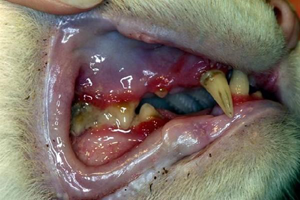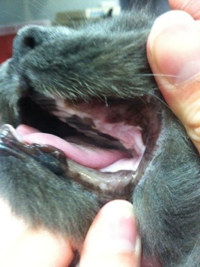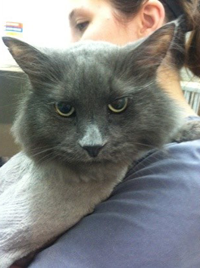Feline Stomatitis - July 2014
By Dr. Megan Belfiore
Stomatitis is a general term that refers to inflammation of the oral cavity. In clinical use the term often describes severe inflammation of the gingiva (gum tissue), but may involve the lips, tongue and back of the throat. Cats of any age or breed can be affected.
 Catrena, 6-year-old female DSH with adult periodontal disease and stomatitis
Catrena, 6-year-old female DSH with adult periodontal disease and stomatitisFelines with stomatitis are in a significant amount of pain. They often have difficulty chewing and eating. Pet owners may also notice bad breath, weight loss, drooling and a decrease in grooming habits.
There is no single cause of feline stomatitis. Dental and periodontal disease is commonly thought of as a trigger of stomatitis in cats. The accumulation of plaque bacteria on and around the teeth causes inflammation involving the gums and oral cavity.
In many cases, the cause appears to be immune-mediated. An over-reaction to plaque bacteria occurs causing the cat’s immune system to attack its own oral tissues. Other medical conditions that can be associated with stomatitis include feline leukemia virus (FeLV), feline immunodeficiency virus (FIV), calicivirus and bartonellosis.
Clinical signs and a thorough oral examination are typically enough to establish a preliminary diagnosis of stomatitis. A long duration of oral inflammation with widespread location of tissues involved is typical of feline stomatitis. If the inflammation is not widespread and is localized to a specific area, other diseases should be considered. Tissue biopsies can help differentiate stomatitis from oral cancer or other disease process. Complete blood work can help to rule out a variety of systemic diseases, and additional tests may be done to rule out feline viral diseases (FeLV and FIV).
Treatment for feline stomatitis depends on each individual case. Stomatitis affects cats differently depending on the stage of stomatitis, the severity of disease and the individual cat's pain tolerance. The ability of the owner to provide home care (daily teeth brushing) is also a factor in treatment planning. Medical, surgical and combination therapy options are available.
Medical therapy has provided short-term control for feline stomatitis; however, the long term results are often frustrating and disappointing. At the present time, surgical therapy (near full-mouth or full-mouth extractions) is the most predictable treatment course for providing definitive resolution of feline stomatitis.
 Buddy, 12-year-old DLH, almost 3 years post-full mouth extractions
Buddy, 12-year-old DLH, almost 3 years post-full mouth extractionsThe surgical procedure often involves the extraction of all teeth or all teeth behind the canines. Because tooth surfaces provide areas for bacteria to attach, removing the teeth can help minimize the bacteria present to provoke the immune system. It is very important to make sure full-mouth extractions are performed by a skilled clinician under the guidance of dental X-rays. If any root tips remain in the mouth, they may continue to cause inflammation.
The majority of cats who undergo full-mouth extractions experience near immediate relief from their chronic (long-term) pain. Owners typically report that their cats are happier than they have been for months and even years after surgical therapy for stomatitis. Most owners are amazed that their cats will go back to
 Buddy, doing great! Happier and healthier than ever!
Buddy, doing great! Happier and healthier than ever!eating hard kibble even though they have few or no teeth. The transformation in the quality of the lives of cats treated surgically for stomatitis is remarkable.
